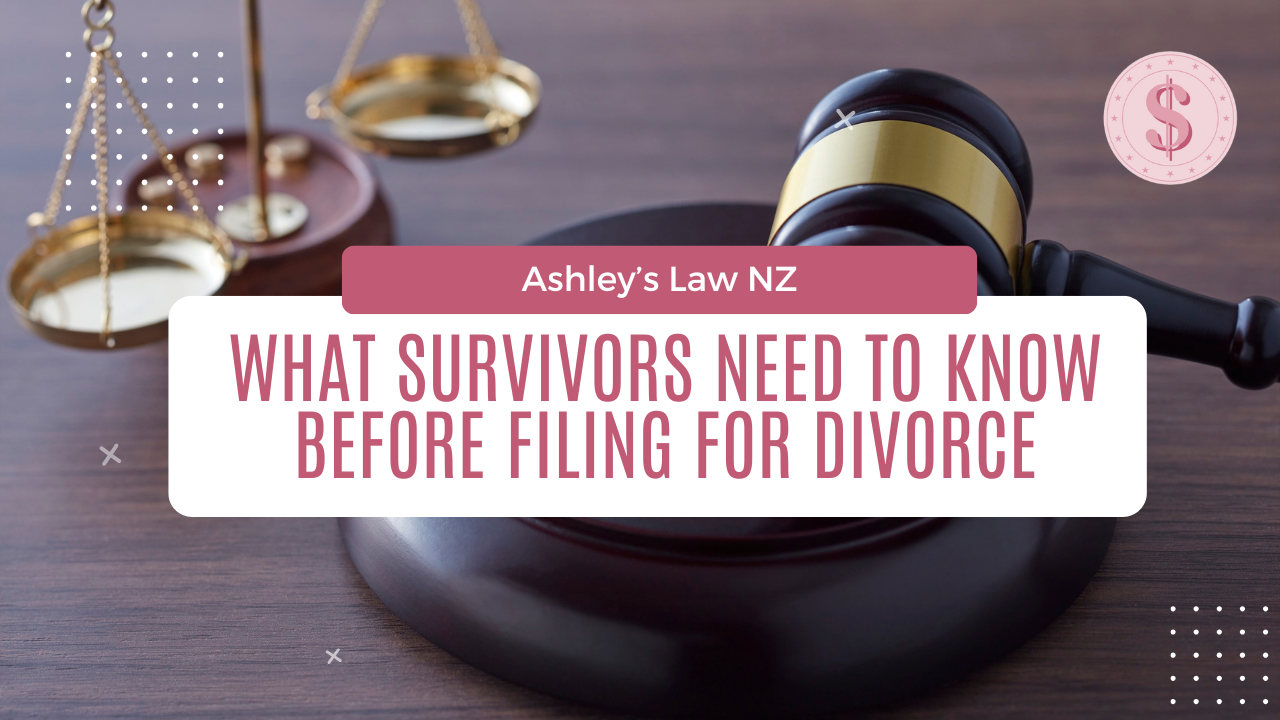Ashley’s Law: A Win for Survivors — But Could It Cost Them Their Financial Future?
On 17 October 2025, a long-overdue change will take effect in Aotearoa.
Known as Ashley’s Law, the new legislation allows survivors of family violence who hold a final protection order to dissolve their marriage immediately — without waiting the usual two years of separation.
It’s a change inspired by one woman’s determination to challenge an unjust system.
The story behind Ashley’s Law
In 2021, Ashley Jones stood on the steps of Parliament to petition for change. She had escaped an abusive marriage but, under New Zealand’s divorce laws, was still legally tied to her abuser for two years.
Despite having a protection order in place, Ashley couldn’t formally end her marriage until the stand-down period passed — a painful legal tie that continued to retraumatise her.
“I was calling for New Zealand to remove the two-year stand down period for victims of abuse,” she later wrote for The Spinoff. “We recognise many forms of abuse — physical, mental, emotional, financial, sexual and spiritual. Yet we enable abusers by leaving them tied to their victim for two years and often longer.”
Her petition, backed by more than 5,000 signatures, was supported in Parliament by MP Angie Warren-Clark, whose member’s bill ultimately led to Ashley’s Law.
It’s a victory that Ashley — and many other survivors — fought hard for. But as the law comes into force, relationship property experts are warning it could have unintended consequences for those it’s meant to protect.
Freedom shouldn’t come with fine print
Under the usual divorce process, married couples have up to three years to bring a relationship property claim (two years of separation, plus one year after dissolution).
However, survivors who use Ashley’s Law may have just one year from the date of dissolution to do so — cutting their window by two-thirds.
Relationship property lawyer Sarah Moon from Clean Break says that while the new law is well-intentioned, the compressed timeframe could leave survivors financially vulnerable.
“On paper, survivors making these applications look like a no-brainer — as survivors can get a divorce sooner. But the hidden cost is that they lose important time to sort out their property,” she explains.
“The first 6–12 months after leaving abuse are about survival — safety orders, children, housing, rebuilding stability. It’s unrealistic to expect survivors to resolve complex property issues during that time.”
My story: peace before fairness
When I left my marriage, I made a promise: if I could leave safely and never have to return overseas, I’d walk away from everything.
I didn’t care about money, or property, or fairness. I just wanted to be safe. I wanted peace.
It’s taken almost six years to rebuild my strength and self-worth — to finally recognise that I deserved what I was entitled to.
And I see this play out again and again.
Women leave abusive or toxic relationships and willingly give up everything they’ve worked for — homes, savings, superannuation — because peace feels more urgent than justice.
It’s not weakness. It’s survival.
But the cost can be years, even decades, of financial instability.
Other hidden risks in Ashley’s Law
The law also requires survivors to serve their ex-partner with the dissolution papers, even if a protection order is final — and that person can still oppose the application.
“That creates more uncertainty and, in some cases, new opportunities for conflict,” says Sarah Moon.
Once the marriage is dissolved, it also becomes harder to access certain types of spousal maintenance, including help with legal or professional costs. Survivors may end up footing expensive legal bills alone, at the exact time they can least afford it.
What needs to change
Clean Break is calling on the government to refine Ashley’s Law so that survivors don’t have to trade financial rights for freedom. Their recommendations include:
Restoring a three-year timeframe for property claims
Ensuring survivors can still claim legal and support costs after dissolution
Reducing opportunities for abusers to oppose or delay applications
As Sarah Moon puts it:
“Survivors deserve freedom from abusive relationships, without delay. But they shouldn’t have to trade away their financial rights to get it.”
If you’re considering Ashley’s Law
If you’re thinking about applying for divorce under Ashley’s Law:
✅ Seek legal advice early — especially around property and finances
✅ Don’t rush decisions — your safety comes first, but fairness matters too
✅ Reach out for support — from lawyers, advocates, or family violence services who understand the risks
Leaving is an act of courage. But rebuilding — emotionally, legally, and financially — takes time and support.
Because survivors deserve more than freedom.
They deserve safety and financial justice. 💔
Further reading:

